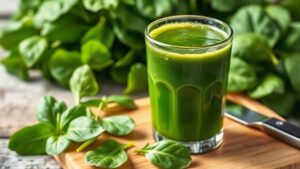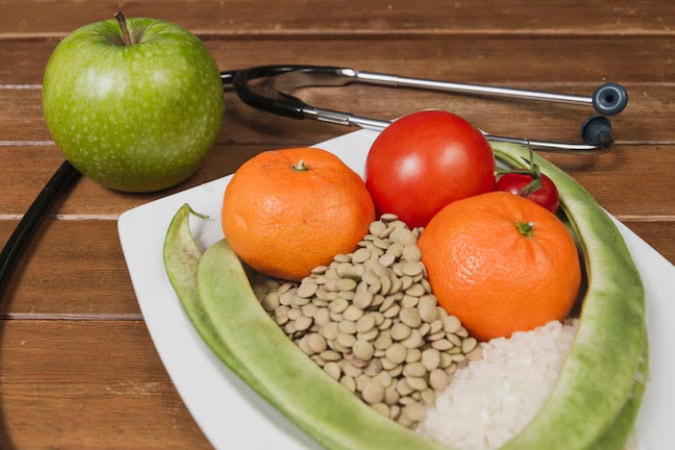Spinach juice packs a powerful punch as it pertains to health benefits. Rich in vitamins and minerals, this green elixir can improve blood circulation, strengthen immunity, and improve digestion. It’s particularly known for its role in preventing anemia and regulating blood pressure. With its array of antioxidants and nutrients, spinach juice can also support eye health and fight off cancer cells. Curious about how to whip up this nutritious drink at home? Keep on exploring.
Health Benefits of Spinach Juice
Although spinach is often overlooked in favor of more trendy superfoods, spinach juice emerges as a powerhouse of health benefits that can significantly improve general wellness. This nutrient-dense elixir is filled with antioxidants like lutein and beta carotene, which combat free radicals and reduce oxidative stress.
Regular consumption of spinach juice might support heart health through lowering blood pressure, thanks to its natural nitrates that elevate nitric oxide levels. Additionally, vitamin A is essential for eye health, reducing risks of macular degeneration, while the vitamin C content aids skin health by promoting collagen production and offering protection against UV damage. Furthermore, spinach juice is rich in essential vitamins that support multiple body systems and enhance overall vitality.
Moreover, research suggests its compounds could even play a role in cancer prevention, making spinach juice a notable addition to any wellness routine.
Prevents Anemia
Spinach juice serves as a natural ally for those looking to prevent anemia, as it provides a rich source of essential nutrients necessary for healthy blood production. This green powerhouse contains 2.7 mg of iron per 100g, key for hemoglobin synthesis.
Iron plays a pivotal role in maintaining red blood cell levels, helping to combat fatigue caused by anemia. Additionally, the 28 mg of vitamin C in spinach juice improves non-heme iron absorption, greatly improving iron bioavailability.
Spinach also delivers 194 mcg of folate per 100g, which further supports red blood cell formation. Combining spinach juice with citrus fruits can maximize iron uptake, ensuring a more effective approach to address deficiencies and elevate general energy levels. Incorporating vitamin C-rich fruits along with spinach juice enhances iron absorption and promotes overall blood health.
Regulates Blood Pressure
At the time it comes to managing blood pressure, few foods offer the benefits that spinach juice does due to its impressive nutrient profile. Rich in nitrates, spinach juice helps convert these compounds into nitric oxide, which proactively dilates blood vessels and lowers systolic pressure through 4-5 mmHg.
A 2021 study revealed that consistently consuming 300ml daily reduced arterial stiffness through 12% in those with high blood pressure. Additionally, the potassium content of spinach—558mg per 100g—counteracts sodium and markedly diminishes stroke risk. The combination of leafy greens’ nutrients significantly enhances circulation and supports overall heart health. Magnesium and folate further boost its health benefits through improving endothelial function and lowering homocysteine levels, respectively. Together, these attributes make spinach juice a crucial ally in maintaining healthy blood pressure levels.
Supports Bone Health
Maintaining blood pressure isn’t just about preventing heart issues; it also ties into general health, including bone strength. Spinach juice emerges as a powerhouse for bone health, offering 181% of the daily value for vitamin K per cup. This vitamin is vital for bone mineralization and boosts calcium absorption, key for maintaining bone density. With 30mg of calcium and 24mg of magnesium per cup, it reduces fracture risk, particularly in postmenopausal women. The juice’s manganese and copper content promotes collagen production, indispensable for bone flexibility.
| Nutrient | Amount per Cup | Health Benefit |
|---|---|---|
| Vitamin K | 181% DV | Supports bone mineralization |
| Calcium | 30mg | Maintains strong bone structure |
| Magnesium | 24mg | Aids in calcium metabolism |
Enhances Eye Health
Although often overlooked, the importance of eye health cannot be stressed enough. Spinach juice, laden with lutein and zeaxanthin, serves as a potent defender against harmful blue light and oxidative damage, essential for safeguarding the retina. Its regular consumption correlates with increased macular pigment density, markedly diminishing the risk of age-related macular degeneration and cataracts, as studies indicate a 43% lower risk for those who indulge.
Additionally, the vitamin A content supports not only night vision but also helps combat dry eyes through maintaining corneal health. Coupled with its impressive vitamin C levels, spinach juice regenerates antioxidants, further enhancing comprehensive eye protection and clarity.
A daily serving can therefore be integral to preserving one’s visual wellness.
Boosts Skin Health
Skin health often reflects general wellness, making it crucial to nourish it from within. Spinach juice, rich in vitamin A, supports skin cell production and combats dryness, while its vitamin C content boosts collagen synthesis, promoting skin elasticity and faster wound healing.
Antioxidants such as lutein and beta-carotene shield the skin from oxidative damage caused by UV rays and environmental pollutants. Additionally, ferulic acid, present in spinach juice, has anti-inflammatory properties that could assist in acne treatment through regulating sebum production.
Importantly, studies indicate that individuals with acne often have lower plasma vitamin A levels, suggesting that adding spinach juice might help address deficiencies linked to skin issues, ultimately encouraging a healthier complexion.
Promotes Healthy Hair
While many factors contribute to healthy hair, spinach juice stands out as an extraordinary ally in this quest. Its abundance of iron greatly improves oxygen delivery to hair follicles, thereby preventing hair loss. Packed with vitamin A, spinach juice also regulates sebum production, maintaining scalp moisture and reducing breakage.
Additionally, the vitamin C content is instrumental in collagen production, which strengthens hair strands and minimizes split ends. Folate supports red blood cell formation, promoting vigorous hair growth cycles.
Finally, essential B vitamins, including biotin, improve keratin infrastructure, boosting hair thickness and shine. Through integrating spinach juice into one’s diet, individuals can support ideal scalp health and encourage flourishing hair. This green elixir truly nurtures from root to tip.
Provides Antioxidants
In the path toward comprehensive wellness, many individuals are already aware of spinach juice’s ability to promote healthy hair. However, the real magic lies in its antioxidant properties.
Packed with flavonoids like kaempferol and quercetin, spinach juice actively neutralizes harmful free radicals. This action helps reduce oxidative stress, a key factor in chronic diseases. Additionally, antioxidants such as myricetin and isorhamnetin strengthen cellular defenses.
Lutein and beta carotene serve as cellular protectors, while ferulic acid and violaxanthin amplify the juice’s anti-inflammatory potential. A study has even shown that spinach juice can help prevent DNA damage through combating oxidative stress.
For those seeking to enhance their health regimen, integrating spinach juice is a wise choice.
Aids Digestion
Although many people could consider spinach juice primarily for its rich nutrient profile, its benefits for digestion are equally noteworthy. This leafy green vegetable is high in vitamins and contains 2.2 grams of fiber per 100 grams, promoting regular bowel movements and helping prevent constipation. The high water content (91%) in spinach juice aids in softening stools, supporting smooth digestion. Key nutrients like magnesium (79 mg per 100g) relax intestinal muscles, combating bloating and cramping. Additionally, spinach juice’s alkaline properties help balance stomach pH, reducing acid reflux and indigestion.
| Nutrient | Benefit | Content per 100g |
|---|---|---|
| Fiber | Promotes regularity | 2.2 grams |
| Water Content | Softens stools | 91% |
| Magnesium | Relaxes intestinal muscles | 79 mg |
| Chlorophyll | Aids detoxification | Present in juice |
Fights Cancer Cells
As spinach makes its way into the spotlight for its numerous health benefits, emerging research reveals its extraordinary ability to combat cancer cells. Packed with potent antioxidants like lutein and beta-carotene, spinach juice can neutralize free radicals associated with DNA damage and cancerous developments.
The flavonoids quercetin and kaempferol show promise in inhibiting cancer cell growth, with studies indicating a significant reduction in colon tumor volume in mice after spinach extract treatment. Moreover, the compound MGDG boosts radiation therapy effectiveness against pancreatic cancer cells.
Regularly consuming leafy greens such as spinach is linked to a 16% reduced risk of lung cancer, underlining the importance of including this nutritious vegetable into a balanced diet for cancer prevention.
Improves Immune Function
Following the impressive cancer-fighting properties of spinach, it’s not just the powerful antioxidants that make this leafy green a star in the nutrition world. Spinach juice greatly improves immune function, thanks to its rich profile of nutrients.
| Nutrient | Amount per 100g |
|---|---|
| Vitamin C | 28 mg (31% DV) |
| Folate | 49% DV |
| Iron | 2.7 mg |
| Antioxidants | Quercetin, Kaempferol |
The vitamin C strengthens immune defenses, while beta-carotene converts into vitamin A, supporting white blood cell activity. Folate is vital for immune cell production, and iron guarantees hemoglobin effectively delivers oxygen to immune cells. Antioxidants like quercetin and kaempferol further reduce oxidative stress, promoting strong immunity.
How to Make Spinach Juice at Home
Making spinach juice at home is not only an easy way to boost nutritional intake but also a pleasing way to enjoy the lively flavors of this leafy green.
To create homemade spinach juice, blend 2 cups of fresh spinach with 1 cup of water for about 30 seconds. Strain the mixture through a fine mesh sieve for approximately 8 oz of spinach juice.
For a richer spinach beverage, consider adding spinach to a juicer with 3 cups of baby spinach, one green apple, and half a peeled lemon.
This juice is loaded with nutrients, offering 150% DV of vitamin K per serving. Through integrating spinach into your daily routine, drink spinach juice and relish the health benefits it provides.





